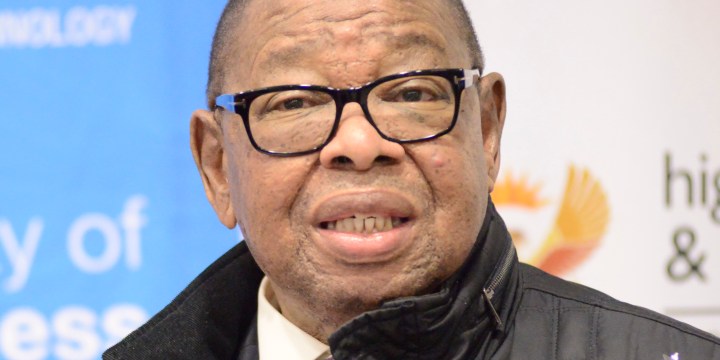HIGHER EDUCATION
Covid-19: Survey finds 65% of students reported psychological distress in 2020

Higher Education Minister Blade Nzimande announced on Monday the findings of a comprehensive study on the social impact of Covid-19 on students. Among the findings, the report revealed that more than 65% of students who participated in the study reported mild to severe psychological distress during the pandemic.
On Monday, 14 June, Minister of Higher Education, Science and Innovation Blade Nzimande released the findings of a study on the social impact of the Covid-19 pandemic on young people in the Post School Education and Training (PSET) Sector. The release of the findings comes days ahead of the 45th commemoration of Youth Day in South Africa.
During the briefing at the Cape Peninsula University of Technology (CPUT), Nzimande said the study “explored young people’s experiences and perspectives on the social impact of Covid-19 on education and learning in South Africa.”
Minister @DrBladeNzimande has arrived at @CPUT (Peninsula University of Technology) for the release of results of @HigherHealthSA COVID-19 Impact Study on Students. The Minister will also do a walk-about at the CPUT Vaccination Centre. pic.twitter.com/3EiEefVinu
— HigherEduTrainingZA (@HigherEduGovZA) June 14, 2021
The study, conducted by the Human Sciences Research Council (HSRC) and Higher Health, the Higher Education and Training health, wellness and development centre surveyed more than 13,000 students from universities, Technical Vocational Education and Training (TVET) and Community Education and Training (CET) colleges across the country.
The survey was conducted amid the first wave of Covid-19 in South Africa; from 18 June 2020 to 18 September 2020.
The study covered a wide range of themes and assessed access to accommodation, food security, quality of remote learning and impact on mental health, as well as substance use and exposure to violence during lockdown.
Key findings of the study included:
- 40% of PSET students moved back home during lockdown;
- 41% of students were unable to purchase their own food during lockdown, of which 10% relied on food donations and 15% went hungry on some days;
- 42% of students thought they would be able to cope with their workload after lockdown, with older students being more confident than younger ones;
- More than 80% of students at universities and universities of technology received institutional support in the form of data bundles, data-free access to websites and online learning platforms;
- 38% of TVET college students reported that their institutions offered virtual learning; and
- 50% of students reported difficulty communicating with their institutions during lockdown, with more difficulty reported among TVET students.
Reacting to the research, Nzimande said that the findings did not represent “a bad picture at all”.
The higher education sector had managed to deal “relatively well” with the Covid-19 pandemic and also managed the completion of the 2020 academic year, he said.
“That is a very important achievement, despite the unevenness,” said Nzimande, who noted that Covid-19 exposed the “depth of social inequalities” in South Africa.
Impact of Covid-19 on teaching and learning
“In particular, I am concerned about the impact of Covid-19 on first-year students, because they are the ones who need to be on campus most; they are the ones who need to adjust from school to university,” said Nzimande.
For reasons including this, it was “very important” that the findings of the report were revealed “because what we may not have done adequately” was focus on the impact of Covid-19 on the youth, he said.
The report findings indicated that the main challenges for students during lockdown were; the loss of study time (57.9%), not having enough money for essential study items (55.8%), loss of social interaction (42.2%) and not having enough money for food (40.1%).
Seven percent of students said they accessed the internet using data bundles provided by their institution, and 29% said they used prepaid data bundles.
According to the report, 5% of students said they did not have access to the internet, with 15% of TVET students reporting no access to the internet.
Mental health and emotional support
Psychological distress was an area of concern for researchers, with the report indicating that more than 65% of students experienced mild to severe psychological distress.
During Monday’s briefing, Chief Research Specialist at the HSRC, Prof Sifunda Sibusiso, said that the figure was “a bit worrying”.
Most participants (78.9%) indicated that students should receive routine counselling support during the pandemic.
Cluster outbreaks
The release of the study’s findings comes as several universities see a resurgence of cases amid the third wave.
“We have had a number of institutions where we’ve had cluster outbreaks, but we’ve been managing them so far,” said Nzimande.
Since mid-October 2020, the Department has recorded “a few” Covid-19 cluster outbreaks at several institutions in the Eastern Cape, KwaZulu-Natal, Western Cape, North West and Gauteng, he said.
“To address these outbreaks, Higher Health along with our leadership from institutions have assembled multidisciplinary investigations teams which have included people from the World Health Organization, the Department of Health, the National Institute for Communicable Diseases and other relevant institutions such as the National Health Laboratory Service to manage and contain these outbreaks,” Nzimande said. DM




















 Become an Insider
Become an Insider